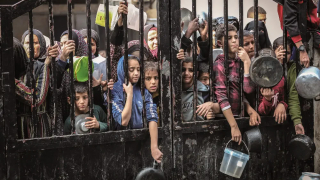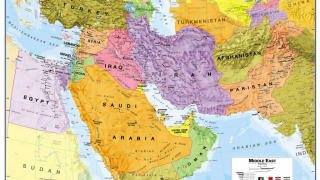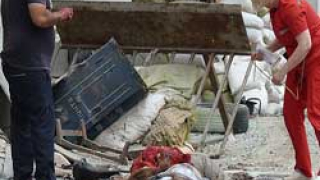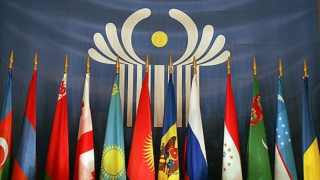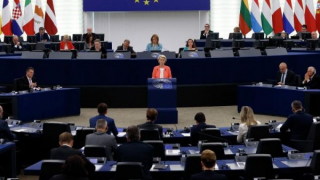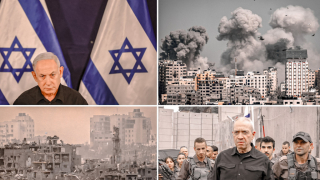THE INVETIBLE WAR: THE RESISTANCE IMMENSE VICTORY
29.03.2018
Damascus, Moscow, Tehran and Hezbollah have emerged as the most politically and militarily powers after the Syrian conflict. Military analysts have concluded that a conflict between this resistance axis against the Zionists, the Saudis and the Americans is becoming increasingly likely. Further, they have assessed that the duo major Palestinian resistance organisations, Hamas and the Islamic Jihad Movement, would partake in the confrontation.
The Zionists frequently threats that Lebanon could be subjected to a huge aerial bombardment in the opening days of the attacks, on the northern border with Syria and Lebanon. Benjamin Netanyahu, the Zionist prime minister, has threatened that his aggressive army would intervene rather than allowing Hezbollah resistance to establish its position on the borders.
On 21 March 2018, War Minister Avigdor Lieberman said that the Zionist soldiers may have to operate deep in the Lebanese territories and manoeuvre on the ground on the battlefield if war breaks out, warning about Hezbollah's attempts to arm itself with precision missiles produced in Lebanon.
The Secretary-General of Hezbollah, Sayyed Hassan Sayyed Nasrallah has asserted that any future conflict could take place inside the occupied Palestinian territory, saying, “There will be no place that is out of reach of the rockets of the resistance.” He adds, “As long as there is a missile that is fired from Lebanon and targets the Zionists, as long as there is one fighter who fires his rifle, as long as there is someone who plants a bomb against the Israelis.”
Unequivocally, the Zionists recognise that Hezbollah resistance has emerged from the Syrian imposed war as a battle-hardened and the most resilient military actor in the Arab region, with highly trained fighters and reservists. Further, its missiles system has been heavily resupplied, in spite of dozens of airstrikes on its convoys and depots.
The NATO and particularly Washington’s plan to fragment Syria, Lebanon and other Arab states into smaller units has been beyond the expectations and has proved its complete failure. Trump’s administration continues to support the Saudis’ devastating war on Yemen, also negotiating an arms deal worth billions to take an aggressive stance towards Hezbollah, the Syrian regime and Iran.
Trump’s administration has already signalled that it will pursue a more confrontational policy against Iran and that there will be an unprecedented support for the Zionists in any conflict, no matter how such a war is conducted.
Obviously, the Saudis have shifted their focus on Lebanon. Amos Harel, the military commentator of the Israeli newspaper Ha’aretz, reported, “If Saudi Arabia is deliberately stoking the flames between the sides [Israel and Hezbollah], this becomes a tangible danger.” The former US ambassador to the Zionist entity Dan Shapiro warned too, “It is plausible that the Saudis are trying to create the context for a different means of contesting Iran in Lebanon – an Israeli-Hezbollah war.”
The resistance enemies have failed to re-establish themselves as the hegemonic power in the Middle East, with absolute control over the natural resources including oil, gas and water. They, in addition, have failed to control Yemen, to oust the brave Syrian President Bashar al-Assad and to halt the resistance’s consecutive victories.
Historically speaking, the Zionist invasion of southern Lebanon, in 1982; aimed at demolishing the Palestine Liberation Organization, has transformed the PLO into a strong power; however, it lacked the mobility that Hezbollah has demonstrated in the subsequent four decades.
Although the Zionists lashed out against the resistance twice, in 1993’s ‘Operation Accountability’ and 1996’s ‘Operation Grapes of Wrath,’ they made no battlefield gains, and the resistance continued to fire Katyusha rockets until the thorough victory on 25 May 2000.
In 2006, the Zionist enemy hit Hezbollah’s headquarters and command facilities and bombed Lebanese infrastructure. After 2006 victory, the resistance has stockpiled hundreds of thousands of rockets and ballistic missiles capable of carrying chemical warheads as well as substantial conventional explosives, in addition to mortars capable of reaching not just border areas but deep into the enemy’s terrains.
Definitely, the Zionists are preparing to wage this new war in a more deliberate and calculated manner. For this reason, they are postponing the war as any coming conflict may jeopardise the Zionist and American final chance in the Middle East. The enemies aim at undermining Hezbollah’s war paradigm and reducing the Iranian and Russian influence in the region.
In the next war, the Zionist economy will immensely shrink, which may cause long-term devastating damage to the enemy’s reputation as a key player in the global economy. Likewise, their infrastructure would not be resilient to Hezbollah’s heavy missile attacks. The Zionists would not be able to bear the dislocation resulting from the resistance’s land, sea and air strikes.
The Saudi Zionist Crown Prince, Mohammed bin Salman has maintained that Iran is a major threat and the only way to surpass the dispute in the Middle East is through openly normalising harmonious ties with the Zionist enemy. Indisputably, if the foolish Saudis decides to wage this war, the tyrant rulers of Bani Saud will collapse [Bani Saud as the Arabic use of ‘Al’ is an honourable title of a legitimate dynasty, such as the household of Prophet Mohammad (PBU’em); Al-Hashem].


